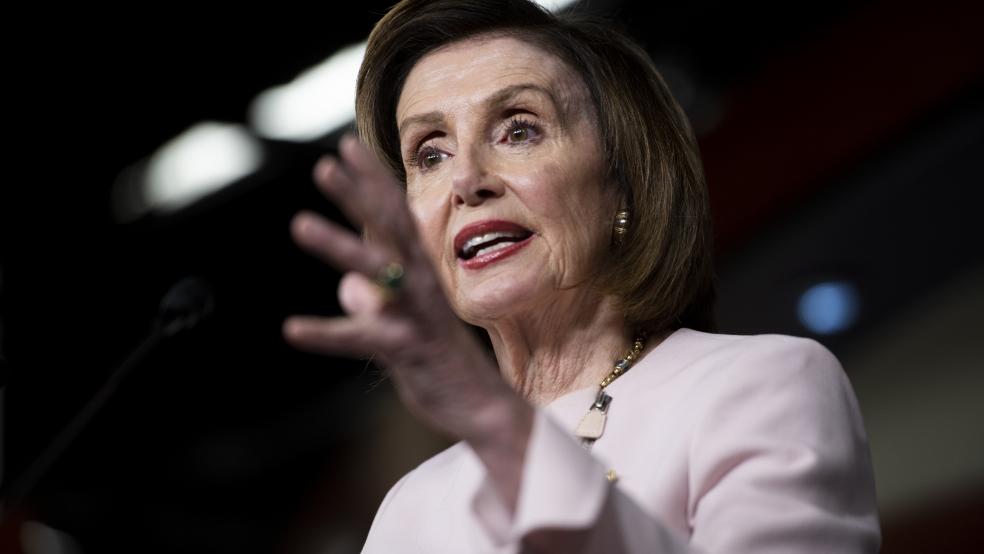Democrats are scrambling to finalize a framework agreement for a roughly $2 trillion economic plan, still hoping to get it done by the end of the week. While a number of Democrats say a deal is in sight, there may still be some obstacles ahead given that members of the party remain split over key elements of the bill — and how to pay for it all.
“We've rounded the turn, and we're almost to the stretch,” House Speaker Nancy Pelosi (D-CA) told reporters Thursday. “And we're making great progress to our goal of securing a framework agreement for Build Back Better in a timely fashion.”
Pelosi added that Democrats were still in the process of narrowing their spending programs and the options for paying for them, but she insisted that the package will be fully paid for.
Other key players sounded far less optimistic about the chances of securing a deal by week’s end. “This is not going to happen anytime soon,” Sen. Joe Manchin (D-WV) said Thursday. “Until you see the text and the fine print, it’s pretty hard to make final decisions.”
On the spending side, Democrats have yet to settle some of their thorniest disagreements. “Some of the largest remaining obstacles,” Politico reports, “include paid leave, Medicare expansion, prescription drug pricing and climate, according to Democrats familiar with the discussions — all issues that risk alienating key factions of the party.”
Among the big issues:
A one-year extension of the expanded child tax credit. Some Democrats have pushed back on the proposal reportedly made by President Biden to shorten then extension of the tax credit to one year, preferring the original plan to keep the credit in place through 2025. Pelosi told reporters that she wants the credit made permanent but would go along with Biden. “This is the president's big issue,” she said. “If it's acceptable to him, in light of the bill, it's acceptable to me.”
Allowing Medicare to negotiate drug prices. Some key Democrats have objected to a proposal included in the House version of the legislation to allow Medicare to negotiate prices for prescription drugs, an idea that the pharmaceutical industry has long opposed.
Senate Finance Committee Chair Ron Wyden (D-OR) and Budget Committee Chair Bernie Sanders (I-VT) both reportedly insist that final legislation will include drug-price negotiation. “We’re going to go to the mat on it,” Wyden said Thursday. “We understand that the American people expect that Congress and Democrats specifically will deliver.”
The version of the provision included in the House bill could reportedly still be changed, with some elements of the plan phased in to ease concerns that the measure could impede the development of new medications. “But with at least three House Democrats opposing the toughest version of the measure, and at least one Senate Democrat, Kyrsten Sinema of Arizona, against it, government negotiating power appears almost certain to be curtailed, if not jettisoned,” The New York Times reports.
Climate provisions: Manchin’s opposition to a key clean energy program has left Democrats scrambling for other ways to meet Biden’s emission-reduction goals. The White House said Thursday that Biden and the administration could take action on their own. “We can do it without Congress,” said White House spokesperson Karine Jean-Pierre said.
The bottom line: Democratic leaders have set an October 31 deadline for their two major pieces of legislation, a bipartisan infrastructure bill and the Build Back Better social spending plan. But they reportedly have also begun to discuss an option to buy some more time by providing another temporary extension of surface transportation funding, this time through December 3.
“We expect negotiations to remain very hectic over the next 10 days,” Evercore ISI analysts Tobin Marcus and Peter Williams wrote in a note to clients Thursday, according to Bloomberg News. “We see a 50-50 chance that Democrats can reach a high-level deal on a reconciliation bill in the $1.8 – $1.9 trillion range by the end of next week.”





